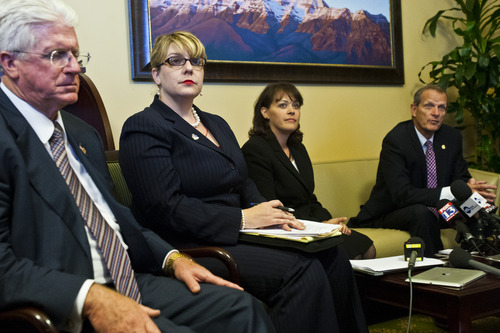This is an archived article that was published on sltrib.com in 2013, and information in the article may be outdated. It is provided only for personal research purposes and may not be reprinted.
Scandals involving Attorney General John Swallow produced an interesting side effect Wednesday: The Legislature had a serious committee discussion about limiting campaign donations in Utah, one of only four states with no such caps.
"I've never seen a discussion like this in my time in the Legislature," said Rep. Kraig Powell, R-Heber City, who has pushed campaign-limit bills in the past but never was able to receive a hearing on them.
"The atmosphere is changing," he added, because of the Swallow saga. "We'll see what effect it has over time."
Three Utah businessmen have said Swallow, as a fundraiser for his predecessor, Mark Shurtleff, in 2009, suggested that a contribution to Shurtleff's campaign would win them special consideration from the Utah attorney general's office if there were complaints about their operations.
Questions also have surfaced surrounding sometimes-sizable campaign donations Swallow and Shurtleff received from companies with ties to online marketing, multilevel marketing, telemarketing, financial coaching and payday-loan companies — all of which frequently draw the attention of consumer watchdogs and occasionally end up being prosecuted by the attorney general's office.
The Government Operations Interim Committee listened to Powell and Rep. Brian King, D-Salt Lake City, discuss previous bills they pushed for limiting donations, but took no action on them — and raised more concerns than support.
"The committee was generally hostile. I think that's a euphemistic way to put it," King said afterward.
But groups — including the League of Women Voters, Utahns for Ethical Government, and the Alliance for a Better Utah — endorsed creating donation limits.
"When you have a governor who is getting checks for $75,000 and $95,000, I don't call those donations. Frankly, I call them investments. And I think that's how the public perceives them," said Maryann Martindale, executive director of the left-leaning Alliance for a Better Utah. Adding limits, she added, "could help restore the public trust." Powell said that similar to the government legally limiting drinking to prevent drunken driving, he views establishing campaign limits as a key to avoiding too-big donations that make it look like groups are buying influence.
"I called my bill the 'governing-under-the-influence bill,' " he said. "We ought to probably have an upper limit to say beyond this amount, we consider this to be a danger to public safety. When we have contributions in the range of $50,000, $100,000 … this is different than the types of contributions we see on average." King said that, with such large donations, "it's naive to believe in that circumstance that an individual contributor wouldn't have some additional pull."
King proposed limiting donations from individuals to $10,000 for candidates seeking statewide office, $5,000 for legislative candidates, $40,000 for parties and $10,000 for PACs.
But Sen. Lyle Hillyard, R-Logan, said limits may make it difficult for candidates to respond to allegations raised by super-PACs — which are allowed to spend unlimited amounts against issues or candidates.
Rep. Ken Ivory, R-West Jordan, said such caps could give extra power to groups such as labor unions that provide manpower instead of money.
Sen. Margaret Dayton, R-Orem, worried it could give wealthy candidates who do not need to raise donations an edge.
One of the few committee members who supported the idea was Sen. Jim Dabakis, D-Salt Lake City, who is chairman of the Utah Democratic Party. He said candidates taking huge sums from people who do business with the state is "just not right. ... It certainly smells corrupt, and it feels corrupt."



